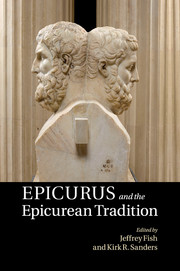Book contents
- Frontmatter
- Contents
- Acknowledgements
- Note on Abbreviations
- List of Contributors
- 1 Introduction
- 2 Autodidact and student: on the relationship of authority and autonomy in Epicurus and the Epicurean tradition
- 3 Epicurus' theological innatism
- 4 Epicurus on the gods
- 5 Not all politicians are Sisyphus: what Roman Epicureans were taught about politics
- 6 Epicurean virtues, Epicurean friendship: Cicero vs the Herculaneum papyri
- 7 Cicero's use and abuse of Epicurean theology
- 8 The necessity of anger in Philodemus' On Anger
- 9 Philodemus, Seneca and Plutarch on anger
- 10 Philodemus and the fear of premature death
- Bibliography
- General index
- Index of passages
2 - Autodidact and student: on the relationship of authority and autonomy in Epicurus and the Epicurean tradition
Published online by Cambridge University Press: 01 June 2011
- Frontmatter
- Contents
- Acknowledgements
- Note on Abbreviations
- List of Contributors
- 1 Introduction
- 2 Autodidact and student: on the relationship of authority and autonomy in Epicurus and the Epicurean tradition
- 3 Epicurus' theological innatism
- 4 Epicurus on the gods
- 5 Not all politicians are Sisyphus: what Roman Epicureans were taught about politics
- 6 Epicurean virtues, Epicurean friendship: Cicero vs the Herculaneum papyri
- 7 Cicero's use and abuse of Epicurean theology
- 8 The necessity of anger in Philodemus' On Anger
- 9 Philodemus, Seneca and Plutarch on anger
- 10 Philodemus and the fear of premature death
- Bibliography
- General index
- Index of passages
Summary
INTRODUCTION
Ancient criticism of Epicureanism was characterized by a paradox. Some opponents reproached Epicurus' zeal for originality, which, they emphasized, was actually intended to cover up his own dependence on his predecessors, and so was self-contradictory. On the other hand, opponents complained about the lack of originality and rigid dogmatism of later Epicureans, who allegedly advanced no positions of their own but instead endeavoured to refer everything back to their master, Epicurus: referre ad unum, as Seneca puts it. Similar criticisms of Epicurus and the Epicurean tradition are to be found in many modern commentators, though this tendency has been somewhat mitigated in certain recent discussions. It has been acknowledged, for example, that the Epicurean tradition allowed for flexibility and individual emphases. There have also been attempts to qualify Epicurus' claims to originality by noting that such pronouncements are largely restricted to contexts involving his own critical engagements with specific educational figures, as for example his dispute with his schoolteacher over Hesiod's Chaos, while elsewhere Epicurus is perfectly open about his familiarity with his predecessors' doctrines. Whatever the weight of such considerations, however, they fail to eliminate the impression that Epicurus' claims to independence were somehow extraordinary. Both his general attitude and the magnitude of his self-confidence are evidenced by the passage from a letter to Eurylochus in which Epicurus, in the context of criticizing his own teacher Nausiphanes, proclaims himself to have been ‘his own pupil’ (ἀκοῦσαι…ἑαυτοῦ).
- Type
- Chapter
- Information
- Epicurus and the Epicurean Tradition , pp. 9 - 28Publisher: Cambridge University PressPrint publication year: 2011
- 3
- Cited by



